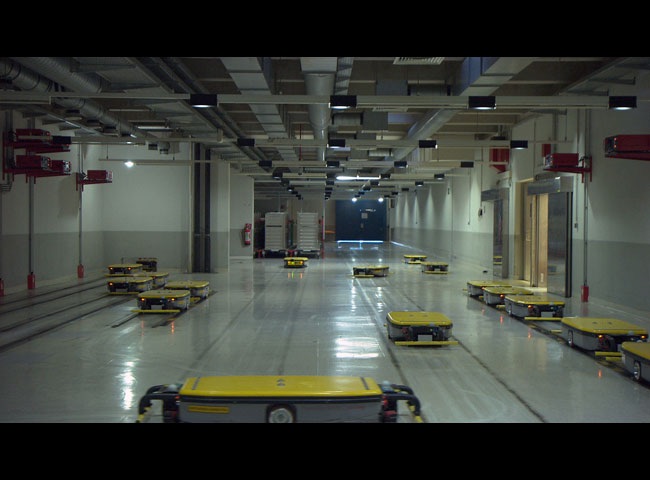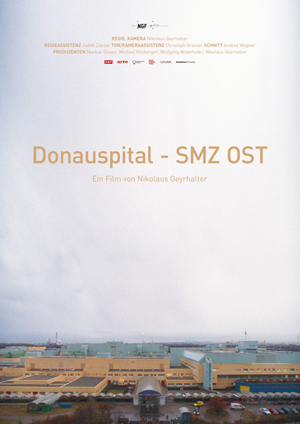Hôpital Danube
-
Réalisé par Nikolaus Geyrhalter • Écrit par Nikolaus Geyrhalter
-
Autriche • 2012 • 75 minutes • HDCam • Couleur
- Réalisation :
Nikolaus Geyrhalter - Écriture :
Nikolaus Geyrhalter - Image :
Nikolaus Geyrhalter - Son :
Christoph Grasser - Montage :
Andrea Wagner
- Production (personne) :
Markus Glaser, Nikolaus Geyrhalter, Wolfgang Widerhofer, Michael Kitzberger - Production (structure) :
Nikolaus Geyrhalter Filmproduktion GmbH - NGF - Diffuseur :
ORF - Österreichischer Rundfunk, ARTE Deutschland TV GmbH - Participation :
Fernsehfonds Austria, Filmfonds Wien, Gefördert von - Ayant droit :
Nikolaus Geyrhalter Filmproduktion GmbH - NGF - Accès au fichier des sous-titres français :
Bpi - Bibliothèque Publique d'Information
- N° ISAN :
ISAN 0000-0003-B453-0000-K-0000-0000-E
Résumé
Tout près de Vienne sur la rive gauche du Danube, l’hôpital Donauspital SMZ-Ost est une ville ultra-moderne de 170 000 m². Dans son enceinte contrôlée, les hommes et les machines opèrent ensemble, jour après jour. Les décisions, les procédures et les gestes qui s'appliquent donnent à observer le fascinant quotidien d’un non-lieu de l'industrie médicale.
"Lent ballet futuriste en ouverture. Des chariots automatiques glissent sur un sol immaculé, suivent sagement leur route programmée et rappellent leur présence d’une voix synthétique. Où sommes-nous ? Dans une usine high tech ? Non, dans un hôpital à Vienne, l’un des plus grands d’Europe : le Donauspital. Fidèle à sa manière, faite de plans fixes rigoureusement cadrés (on se souvient de l’observation glacée de Notre pain quotidien, consacré à l’industrie alimentaire), Nikolaus Geyrhalter et son équipe réduite (contrainte d’espace oblige) ont posé la caméra dans ce lieu où, de naissance à trépas, défilent tant d’existences. D’un étage à l’autre, d’un massage aux urgences, des temps de culte aux réunions de travail, le regard chirurgical du cinéaste se veut exhaustif, organisé avec simplicité selon la chronologie d’une vie. Assembler, trier, mesurer, découper la viande à la cantine comme les corps sur la table de dissection, réparer les robots de même que, à coups de marteau, les os d’un patient, tout cela est égalisé par la caméra. Observer, voilà le maître mot. Car s’y révèle la cruelle affinité entre l’acte médical et celui du cinéaste. Même précision, même efficacité : même distance. Ainsi cette opération de l’œil, menée à l’aide d’un retour vidéo en gros plan, pointe le projet du film : plutôt que dévoiler un univers rationnel à part, présenter Donauspital comme la maquette de notre monde, miroir grossissant de notre modernité où les contours seraient soudain plus nets."
(Nicolas Feodoroff, FIDMarseille)
Danube Hospital, a portrait of one of Europe’s largest hospitals, shows the daily routines and work processes at a powerful and highly complex institution. By depicting a modern healthcare facility, Danube Hospital holds a mirror to our society to show how it deals with health and illness, life and death. Nikolaus Geyrhalter observes what goes on in a variety of zones, in conference areas, ORs, patients’ rooms, the disinfection and pathology departments, and the kitchen. As the film visits all these areas, it follows an ingenious principle of a puzzle whose pieces produce an effect only when fully assembled. A portrait of an institution in which the relationships between processes that are invisible to patients and visitors are shown in all their precision.
"The film opens with a slow futurist ballet. Automatic carts slide across a pristine floor, quietly following their programmed route and recalling their presence with a synthetic voice. Are we in a high tech factory? No, we are in a hospital in Vienna, one of the biggest in Europe: the Donauspital. In keeping with his approach, consisting of rigorously framed long shots (recalling the icy observation in Our Daily Bread, devoted to the food industry), Nikolaus Geyrhalter and his reduced team (due to constraints of space) placed the camera in this location where so many existences file past, from birth to death. The surgical gaze of the filmmaker is exhaustive (from one floor to another, from a massage in the emergency room, to religious services to work meetings) and is simply organized in relation to the chronology of a life. Assembling, sorting, measuring and cutting the meat in the cantine and the bodies on the dissection table, repairing the robots with blows from a hammer like the bones of a patient: everything is equalized by the camera. Observation is the key word. Because what is revealed here is the cruel affinity between the medical act and that of the filmmaker. The same precision, the same efficiency: the same distance. Thus an eye operation, carried out with the aid of a video recording shot in close-up, underlines the project of the film which is not to unveil a separate rational universe but to present Donauspital as a model of our world, a magnifying mirror of our modernity where the contours are suddenly sharper."
(Nicolas Feodoroff, FIDMarseille)
Mot(s)-clé(s) thématique(s)
Sélections et distinctions
- 2013 • Images en bibliothèques • Paris (France) • Film soutenu par la Commission nationale de sélection des médiathèques
- 2013 • IndieLisboa - Festival international du cinéma indépendant de Lisbonne • Lisbonne (Portugal) • Honorable Mention - World Pulse Culturgest Award
- 2013 • Planete Doc Film Festival • Varsovie (Pologne) • Sélection officielle
- 2012 • FIDMarseille - Festival International de Cinéma de Marseille • Marseille (France) • Compétition Internationale
- 2012 • IDFA - International Documentary Festival Amsterdam • Amsterdam (Pays-Bas) • Sélection officielle
- 2012 • Diagonale • Graz (Autriche) • Sélection officielle
Comment avoir accès au film ?
- Sortie en salle
-
Édition DVD
- Il n'existe pas d'édition DVD à notre connaissance
- Accès VOD


